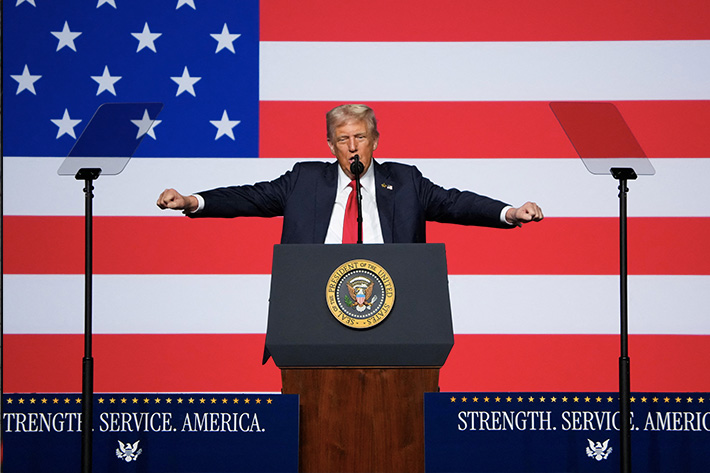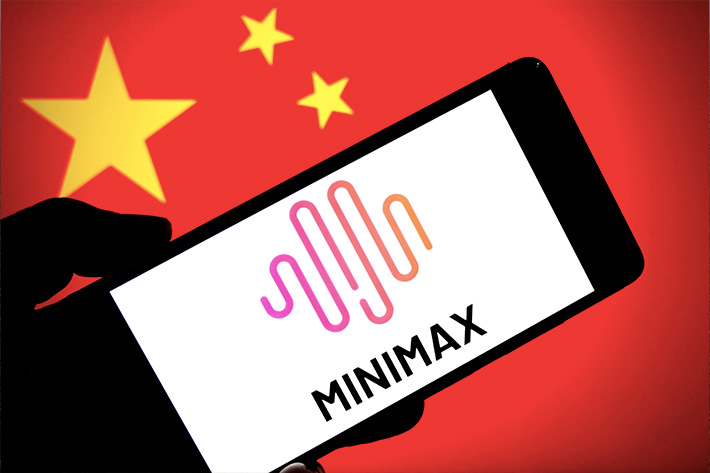Stocks across Asia were volatile and racked with uncertainty on Monday after a whirlwind weekend during which US President Donald Trump threatened to levy another 100% tariffs on China before seemingly cooling his stance.
Stocks in Hong Kong, Taiwan and South Korea took a beating but staged a small recovery before close, ending lower by 1.5%, 1.4% and 0.7% respectively.
Chinese stocks, meanwhile, fared better recouping much of their losses, ending the day lower by only 0.5% despite opening more than 2.7% down.
Also on AF: China Hits US Ships With Extra Port Fees as Trade Tensions Rise
The market turmoil came as hostilities between China and the US flared once again last week, after Beijing unexpectedly expanded its rare earth export controls to cut off American defence firms and chip firms. On Friday, US President Donald Trump responded with a threat of 100% tariffs on China from November 1.
Trump’s announcement wiped off $770 billion from the US’ biggest technology firms.
On Sunday, though, Trump sounded more conciliatory in a note he posted on his social media platform Truth Social, saying that everything would be fine and the US did not want to “hurt” China.
“Highly respected President Xi just had a bad moment,” Trump wrote in his post. “He doesn’t want Depression for his country, and neither do I. The U.S.A. wants to help China, not hurt it!!!”
The post boosted sentiment, with traders hoping the US would temper its latest escalation of the trade war with China.
“Certainly it’s pretty nervous out there,” said Tim Kelleher, head of institutional FX Sales at Commonwealth Bank in Auckland.
“If you look at the U.S. and China stuff, it looks like Trump has done a bit of a TACO again and softened his tone,” he added, referring to a trading adage that “Trump always chickens out.”
Meanwhile, investors were also upbeat as global markets staged a quick recovery, with European shares opening higher and US markets also firming.
“The stabilisation in markets is encouraging,” said Rory McPherson, chief investment officer at Wren Sterling in London.
“Given everything that is going on with the (U.S. government) shutdown, and political turmoil in France and Japan, markets have been strong. A pullback would be healthy.”
Still, even with sentiment on the up on Monday, analysts said the mood was fragile and currencies were likely prone to larger price swings. In a sign that global uncertainties remained strong, gold hit fresh record highs above $4,000 an ounce.
US blindsided by rare earth curbs
Trump’s Friday announcement was a reaction to China dramatically expanding its rare earth element export controls. China produces over 90% of the world’s processed rare earths and rare earth magnets. Many are vital materials in products ranging from electric vehicles to aircraft engines and military radars.
“It was shocking,” Trump said of China’s steps, which did not specifically target Washington. “I thought it was very, very bad.”
Terming China’s actions a “hostile order,” Trump said he had been forced “to financially counter their move.” “For every Element that they have been able to monopolise, we have two,” Trump said.
On Sunday, Trade Representative Jamison Greer said the US had been blindsided by Beijing’s announcement and was ‘deferred’ when it reached out for dialogue.
“I can tell you that we were not notified, and quickly, as soon as we found out from public sources, we reached out to the Chinese to have a phone call, and they deferred,” Greer told Fox News’ “Sunday Briefing,” while calling China’s move “a power grab.”
Meanwhile, Beijing defended its curbs on exports of rare earth elements and equipment as a response to aggression from the US, accusing its economic rival of what it called “double standards.”
In a report by state broadcaster CCTV, the Chinese commerce ministry defended its curbs on exports of rare earth elements and equipment, but stopped short of imposing new levies on U.S. products. It said the restrictions are driven by concern over the military applications of these elements at a time of “frequent military conflicts.”
Beijing also pointed out the US added Chinese companies to a trade blacklist and levied port fees on China-linked ships as examples.
Trump and Xi still might meet
China and the US have been embroiled in a trade war since Trump returned to the White House earlier this year. After months of tensions, the two were able to reach a temporary deal in May, staving off triple digit tariffs they had imposed on each other.
Trump and his Chinese counterpart Xi Jinping were expected to meet in-person at the end of this month in South Korea, at the Asia-Pacific Economic Cooperation (APEC) Economic Leaders’ Meeting, to discuss trade, illicit drugs and Russia’s war in Ukraine.
In his Friday announcement, though, Trump called that meeting into question. “Now there seems to be no reason to do so, Trump said in another post on Truth Social.”
Later, he told reporters at the White House that the meeting might not be cancelled. “I haven’t canceled,” Trump later told reporters at the White House. “I would assume we might have it.” Beijing has never confirmed the meeting.
US trade official Greer also said the Trump-Xi meeting could still happen.
Martin Muehleisen, a former IMF strategy chief who is now with the Atlantic Council, said Trump’s threats may be posturing for negotiating leverage, but said they will inject volatility into the week’s proceedings.
“Let’s hope that sanity prevails. If Trump goes back to 100% tariffs on Chinese goods, there’s going to be a lot of pain in the markets for him,” Muehleisen told Reuters.
Analysts said the stakes had risen for a positive outcome from a Trump-Xi meet, if it still happens.
“Things are going to get interesting,” said Scott Kennedy, a China business and economics expert at Washington’s Center for Strategic and International Studies think tank.
“They both are hoping that amping up pressure will lead the other to make concessions in advance of APEC, or they are now re-escalating assuming a deal at APEC is impossible and are gaining leverage for the next round of the fight.”
- Reuters, with additional editing and inputs from Vishakha Saxena
Also read:
China Stocks Drop Off 10-Year High; HK Down Amid Trade Tension
China Steps up Checks on Nvidia AI Chips at Major Ports, FT Says
US Keen to Control More Ports, Cut China’s ‘Maritime Advantage’
China Sets up Tracking System to Trace Its Rare Earth Magnets
China Stops Most Antimony Exports But Rare Earth Sales to US Soar
China Did Not Agree to Military Use of Rare Earths, US Says
China Export Curbs on Rare Earth Magnets: a Trade War Weapon
Lessons From Japan on Tackling China’s Rare Earth Dominance
























